- Home
- Iris Murdoch
A Severed Head Page 3
A Severed Head Read online
Page 3
‘Wait a minute,’ said Antonia. Her voice sounded thick, almost as if she were drunk. She was taking slow deep breaths, like someone collecting his powers.
I said sharply, ‘What’s the matter, Antonia? Has something bad happened?’
‘Yes,’ said Antonia. ‘Wait a minute. Sorry.’
She sipped her drink and then poured the rest of it into my glass. I realized that she was inarticulate with emotion.
‘For God’s sake, Antonia,’ I said, beginning to be thoroughly alarmed. ‘Whatever is it?’
‘Sorry, Martin,’ said Antonia. ‘Sorry. Wait a minute. Sorry.’
She lit a cigarette. Then she said, ‘Look, Martin, it’s this. I’ve got to tell you now. And there’s no way of breaking it gently. It’s about me and Anderson.’ She was looking away from me now and I could see the hand holding the cigarette trembling.
I was still slow. I said, ‘You and Anderson what, angel?’
‘Well, just that,’ said Antonia, ‘just that.’ She threw the cigarette into the fire.
I stared at her and began to think and to read her face. Her manner more than her words frightened me a lot. I was so used to repose in the peace of her simple confident spirit. I had hardly ever seen my golden Antonia so shaken, and this in itself was dreadful. I said gently, ‘Do I understand you? If you mean you’re a bit in love with Palmer, I’m not surprised. I’m a bit in love with him myself.’
‘Don’t be flippant, Martin,’ said Antonia. ‘This is serious, it’s fatal.’ She turned towards me, but without taking my gaze.
I pushed back the shorter strands of golden hair from her big pale lined brow and drew my hand down her cheek to her mouth. She closed her eyes for a moment, remaining rigid. ‘Well, do stop looking like that, dearest. You look as if you were going to be shot. Calm down and have your drink. Here, I’ll pour you out another one. Now talk to me rationally, and don’t frighten me out of my wits.’
‘You see, it’s not a matter of being a bit in love,’ said Antonia, looking at me now with a glazed troubled stare. She spoke monotonously as if in her sleep, with an air of comatose desperation. ‘It’s a matter of being very desperately and deeply in love. Perhaps we ought to have told you sooner, only it was so improbable, such an extreme love. But now we’re certain.’
‘Aren’t you both a bit old for this game?’ I said. ‘Come now!’
Antonia looked at me, her eyes hardened a little, and she became suddenly more present and conscious. Then she smiled sadly and gave a slight shake of the head.
This impressed me. But I said, ‘Look, darling, need we be quite so serious about this?’
‘Yes,’ said Antonia. ‘You see, I want a divorce.’
She had found the word difficult to utter. At the shock of it I stared at her, and bracing her body stiffly she stared back at me, trying to control her face. She lacked expressions for a scene of this austerity. I said, ‘Don’t be ridiculous, Antonia. Don’t say wild things that you don’t mean.’
‘Martin,’ said Antonia, ‘please help me. I do mean it, and it will save us a lot of pain if you will understand me now, and see what things are like now. I know this must be a ghastly shock. But please try. It makes me utterly wretched to hurt you like this. Please help me by understanding. I am quite certain and quite determined. I would not have spoken to you if I were not.’
I looked at her. She would soon be in tears, her face stripped, strained like something exposed to a great wind; but there was, in her retention of control, a certain touching dignity. I could not yet believe her or believe that there was anything here which the customary pressure of my will could not sweep aside. I said quietly, ‘You’re in an over-excited state, my sweet. Has that wretch Palmer been giving you drugs, I wonder? You say you’re in love with him. All right. That often happens in analysis. But let’s not have any more nonsense about divorce. And now can we just abandon this topic for the present? I suggest you finish your drink and then go and dress for dinner.’
I tried to rise, but Antonia grasped my arm, lifting a pitiful yet violent face. ‘No, no no’ she said. ‘I must say it all now. I can’t tell you what this costs me. I want a divorce, Martin. I’m deeply in love. Just believe me, and then let me go away. I know it’s absurd and I know it’s dreadful, but I’m in love and I’m absolutely relentless. I’m sorry to surprise you and I’m sorry to speak like this, but I’ve got to make you understand what I mean.’
I sat down again. There was a desperate fierceness in her manner, but there was also fear, fear of my reactions. It was the fear which began to convince me and I felt the first light touch of a nightmarish terror. Yet this strange half-savage, half-terrified being was still my Antonia, my dear wife. I said, ‘Well, well, if you’re so much in love with your analyst perhaps you’d better go to bed with him! Only don’t talk to me about divorce, for I simply won’t hear of it!’
‘Martin!’ said Antonia in a shocked tone. Then she said, and her voice became monotonous again, ‘I’ve already been to bed with him.’
My cheeks became hot with a sudden rush of blood as if I had been struck. My knee was against Antonia’s. I captured Antonia’s two hands which were still clawing at my sleeve, in a strong grip in my left hand. ‘Since when? And how many times?’
She looked back at me, frightened but still firm. Antonia had her own soft frantic evasive way of getting what she wanted. I could feel her will upon me like a leech. She said, ‘That doesn’t matter. If you really want the details, I’ll tell you later. Now I just want to tell you the main truth, to tell you that you’ve got to set me free. This thing has overwhelmed me, Martin. I’ve simply had to give in to it. Honestly, it’s all or nothing.’
I crushed her wrists in my left hand. It may seem strange, but I was conscious of wondering and of deciding now how I ought to react, I was very conscious of her fear of a blow. I let go of her hands and said, ‘Well, let me recommend nothing.’
Antonia relaxed and we drew a little apart. She gave a deep sigh and said, ‘Oh, darling, darling —’
I said, ‘If I broke your neck now I’d probably get off with three years.’ I got up and leaned against the mantelpiece looking down at her. ‘What have I done to deserve this?’ I said.
Antonia smiled nervously. She patted her hair, her long fingers straying over the bun, pushing in hair-pins. She adjusted the neck of her blouse. She had a little the air of feeling that the worst was over. She said, ‘I hate this, Martin. And I’ve been in torment. You’ve been so perfect. But I’m beyond thoughts about justification. I’m just desperate.’
‘Yes, I have been perfect, haven’t I?’ I said. ‘But still I don’t accept what you say. We’ve been happy. I want to go on being happy.’
‘Happy, yes,’ said Antonia. ‘But happiness is not the point. We aren’t getting anywhere. You know that as well as I do.’
‘One doesn’t have to get anywhere in a marriage. It’s not a public conveyance.’
‘You must face the fact,’ said Antonia, ‘that you’re a disappointed man.’
‘I’m damned if I’m a disappointed man,’ I said, ‘and if I were it certainly wouldn’t be your fault. What you mean is that you’re a disappointed woman.’
‘A marriage is an adventure in development,’ said Antonia, “and ours is simply at a standstill. I was conscious of that even before I fell in love with Anderson. It’s partly my being so much older and being a sort of mother to you. I’ve kept you from growing up. All this has got to be faced sooner or later.’ She sipped her drink. She had stopped looking frightened.
‘Spare me the clinical stuff, for Christ’s sake,’ I said, ‘it makes me feel sick. Leave me because you want someone else, let’s have honest lust, not pseudo-science. But in any case you aren’t going. You can’t make changes like this at your age. You’re my wife and I love you and I want to go on being married to you, so you’d better resign yourself to having a husband and a lover.’
‘No,’ said Antonia. ‘I’ve got to go, Martin, I�
��ve got to. C’est plus fort que moi.’ She got up and stood there opposite to me, her stomach thrust out, tall, twisted into a pillar of determination. She added, ‘I’m extremely grateful to you for being so rational about it.’
I stared at her beautiful haggard face, concentrated now in a look of boldness mixed with a sort of cringing pity. Her big mobile mouth was working as if she were masticating inwardly the tender things she might have said. I had a sense of miserable confusion and of things having utterly escaped my control. “I’m not being rational,’ I said. ‘I can hear what you say, Antonia. But your words make no more sense to me than if you were a mad woman. I think I’d better go and talk to Palmer. And if he says we must behave like civilized men I shall kick his teeth in.’
‘He expects you, darling,’ said Antonia.
‘Antonia,’ I said, ‘let me out of this bad dream. Pull yourself together. This is what is real, our marriage.’
She simply went on shaking her head.
‘Anyway, my darling, my Antonia, what would I ever do without you?’
The painful concentration of her face increased and then dissolved as she gave a cry and began suddenly to weep. She looked infinitely pathetic when she was in tears. I went to her and she bowed her head slowly on to my shoulder, not raising her hands to her face. The tears fell between us.
‘I knew you’d be good about it,’ she said in a moment. ‘I’m so relieved to have told you. I’ve hated lying about it. And you know, you need never do without me.’ And she repeated, ‘Thank you, thank you,’ as if I had already set her free.
I said, ‘Well, I haven’t broken your neck, have I?’
She said, ‘My child, my dear child.’
Four
‘So you don’t hate me, do you, Martin?’ said Palmer.
I was lying down on the divan in Palmer’s study where his patients usually reclined. Indeed I was to all intents and purposes his patient. I was being coaxed along to accept an unpleasant truth in a civilized and rational way.
‘No, I don’t hate you,’ I said.
‘We are civilized people,’ said Palmer. ‘We must try to be very lucid and very honest. We are civilized and intelligent people.’
‘Yes,’ I said. I lay still and sipped the large cut-glass tumbler of whisky and water which Palmer had just replenished for me. He himself was not drinking. As he talked, he paced to and fro, tall and lean, with his hands behind his back, the purple dressing-gown which he wore loosely over his shirt and trousers making a gentle silky swish. He paced to and fro in front of the line of Japanese prints which decorated the far wall, and bandit faces leered from behind him. His small cropped head moved against the blurred soft blues and charcoal blacks of the prints. The air was warm and dry, agitated by a mysterious breeze from some invisible fan. I was sweating.
‘Antonia and I have been very happy,’ I said. ‘I hope she has not misled you here. I still cannot take this in or accept it. Our marriage is an extremely solid structure.’
‘Antonia could not mislead me if she tried,’ said Palmer. ‘Happiness, my dear Martin, is neither here nor there. Some people, and Antonia is one, conceive of their lives as a progress. Hers has been standing still for too long. She is due to move on.’ He glanced at me occasionally as he paced, his slightly American voice soft and slow.
‘Marriage is an adventure in development,’ I said.
‘Exactly.’
‘And it is time for Antonia to take a more advanced course.’
Palmer smiled. ‘You are charming to put it so!’ he said.
‘So the thing has a sort of inevitability.’
‘I admire your capacity for facing the facts,’ he said. ‘Yes, perhaps it has a sort of inevitability. I do not imply this in order to avoid my own responsibility or to help Antonia to shirk hers. There is little point in talking of guilt, and it was not to talk of that that I saw you this evening. You know as well as I do that any such talk would be insincere, whether in your accusations or my confessions. But we are causing hurt and damage. For instance to Antonia’s mother, who is fond of you. And there are others. Never mind. We do not close our eyes to this or to anything.’
‘What about me?’ I said. ‘Damn Antonia’s mother!’
‘You will not be damaged,’ said Palmer. He paused in front of me, looking down with a tender concentration. ‘This is a big thing, Martin, something bigger than ourselves. If it were not so, Antonia and I might have played things differently. It would then have been possible to deceive you, though whether we would have done so I don’t know. But this is too important and it is something that holds all three of us. You will see. I would not say this unless I were pretty sure. I know Antonia very well, Martin. Better in some ways than you do. That’s not your fault but my profession. I know you better in some ways than you do.’
‘I doubt that,’ I said. ‘I’ve never subscribed to your religion. So according to you we’re all going to be better off.’
‘Yes,’ said Palmer. ‘I don’t say happier, though that might be so too. But we shall grow. You have been a child to Antonia and she a mother to you, and that has kept you both spiritually speaking at a standstill. But you will grow up, you will change, more than may now seem to you possible. Haven’t you sometimes realized the extent to which you now regard yourself both as a child and as an old man?’
This was very acute. ‘Nonsense,’ I said. ‘I reject your explanations. Things were very well between me and Antonia before you turned up.’
‘Hardly, my dear Martin,’ said Palmer. ‘There was your failure to give her a child.’
‘Her failure to give me a child.’
‘There you are, Martin,’ said Palmer. ‘Each naturally thinks of it as the fault of the other. And the biological evidence is indecisive, as you know.’
The warmth and Palmer’s almost noiseless movements and his repetition of my name had produced in me a sort of stupor, so that I hardly knew what to say to him. I said, ‘You aren’t hypnotizing me, are you?’
‘Of course not,’ said Palmer. ‘What would that profit me? Relax, Martin. Take your jacket off. You’re streaming with perspiration.’
I pulled it off and undid my waistcoat and rolled up my shirt sleeves. I had trouble with the cuff links. I tried to sit up a little, but the divan was not made for sitting up, so I lay back again. I stared up at Palmer, who had paused once more in front of me, his smooth clever American face all gentleness and concern, his fur of silver hair shining in the lamplight. There was something abstract in his face. It was impossible to pin wickedness or corruption on to such an image.
‘It is an important fact,’ said Palmer, ‘that you and I began it. We began it, did we not, by becoming exceptionally attached to one another. Attachments of that degree are rare in my life. You are certain you are not angry with me?’
‘Cher maître!’ I said. I contemplated Palmer’s clear open face with its uncanny youthfulness. ‘I seem not to know how to be angry with you,’ I said slowly, ‘although in a way I want to be. I’ve drunk too much already this evening and I’m not yet sure what has happened to me. I feel very desolate and hurt and confused, but not angry.’ It occurred to me then as significant that I had come to see Palmer this evening instead of summoning him to see me. It had not even come into my mind to summon him. It was I who had come running.
‘You see, Martin, I am wrapping nothing up,’ said Palmer.
‘Yes, you are,’ I said, ‘but very cleverly. It’s all wrapping. You’re too clever for me. No wonder Antonia wants you. She’s probably too clever for me too, only I never realized it.’
Palmer stood looking at me for a while, serene and detached and tender with only a very little anxiety in his look. He pulled at the top of his dressing-gown where a snowy white shirt emerged, and bared a little more of his long neck. Then he resumed his pacing. He said, as if confidently testing something out, ‘I knew you’d take it well, I knew you’d take it splendidly.’
‘I’m not aware that I’ve yet rev
ealed how I’m taking it!’ I said. But as I said this I realized with a bitter clarity that I had already fallen into my role, my role of ‘taking it well’, which had been prepared for me by Palmer and Antonia. I had put my head straight into the halter which with care and concern and even affection was being held out. It was important to them that I should let them off morally, that I should spare them the necessity of being ruthless. But if I had power, I was already surrendering it. It was already too late for violence. I was indeed facing something big and formidably well organized.
Palmer seemed to ignore my remark. ‘You see,’ he said, ‘it is not all our idea that you should leave us. In a strange and rather wonderful way we can’t do without you. We shall hold on to you, we shall look after you. You’ll see.’
‘I thought I was supposed to grow up.’
Palmer laughed. ‘Oh, don’t imagine it will be easy! Nothing here will be easy. It will be a dangerous adventure. But as I say, your liking me so much is the important thing.’
‘How do you know I’ll keep on liking you, Palmer?’ I said. I felt my faculties slipping.
‘You will,’ said Palmer.
‘Loving one’s successful rival?’
‘The psyche is a strange thing,’ he said, ‘and it has its own mysterious methods of restoring a balance. It automatically seeks its advantage, its consolation. It is almost entirely a matter of mechanics, and mechanical models are the best to understand it with.’
‘You don’t see me then as an angel of compassion?’
Palmer laughed gaily. ‘Bless you, Martin,’ he said. ‘Your irony will be the saving of all three of us.’
Five

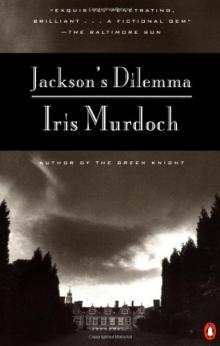 Jackson's Dilemma
Jackson's Dilemma The Flight From the Enchanter
The Flight From the Enchanter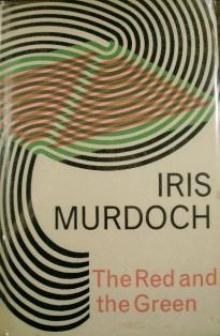 The Red and the Green (Vintage Classics)
The Red and the Green (Vintage Classics) A Severed Head
A Severed Head The Black Prince
The Black Prince The Nice and the Good
The Nice and the Good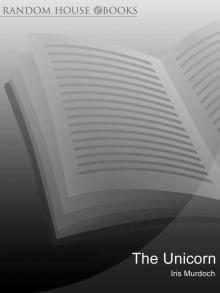 The Unicorn
The Unicorn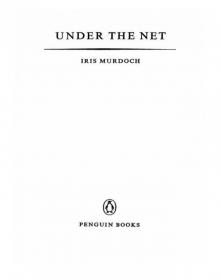 Under the Net
Under the Net The Italian Girl
The Italian Girl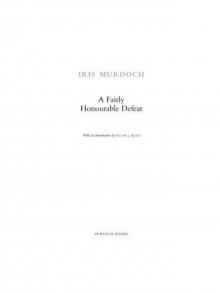 A Fairly Honourable Defeat
A Fairly Honourable Defeat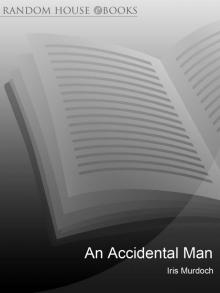 An Accidental Man
An Accidental Man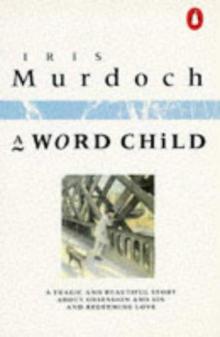 A Word Child
A Word Child The Philosopher's Pupil
The Philosopher's Pupil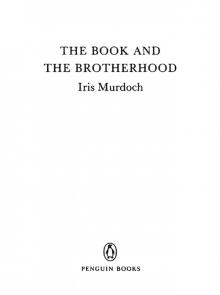 The Book and the Brotherhood
The Book and the Brotherhood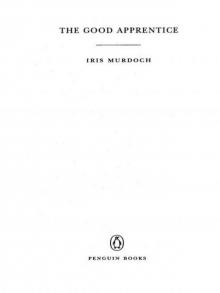 The Good Apprentice
The Good Apprentice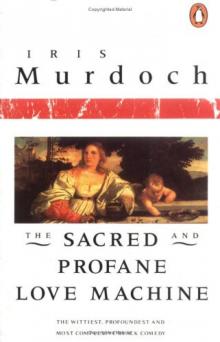 The Sacred and Profane Love Machine
The Sacred and Profane Love Machine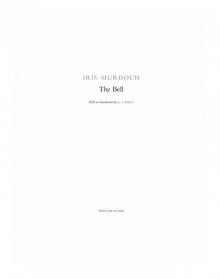 The Bell
The Bell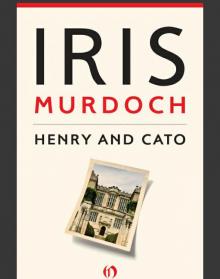 Henry and Cato
Henry and Cato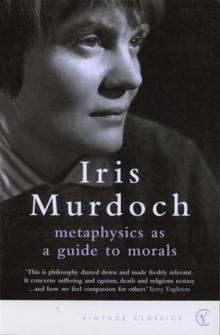 Metaphysics as a Guide to Morals
Metaphysics as a Guide to Morals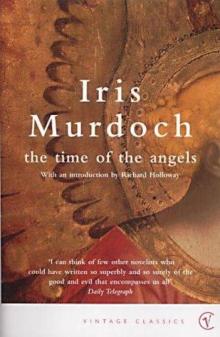 The Time of the Angels
The Time of the Angels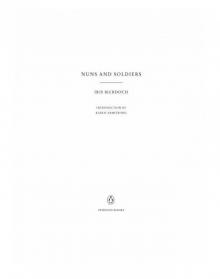 Nuns and Soldiers
Nuns and Soldiers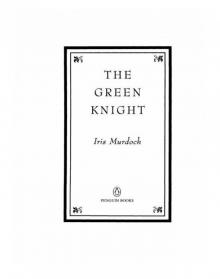 The Green Knight
The Green Knight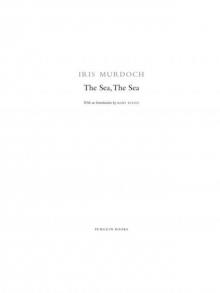 The Sea, the Sea
The Sea, the Sea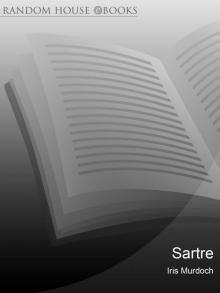 Sartre: Romantic Rationalist
Sartre: Romantic Rationalist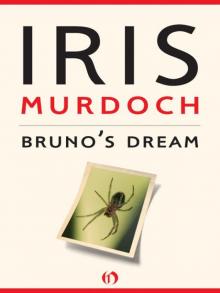 Bruno's Dream
Bruno's Dream An Unofficial rose
An Unofficial rose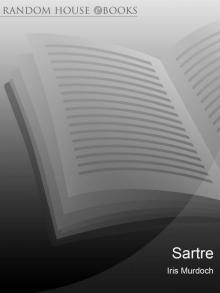 Sartre
Sartre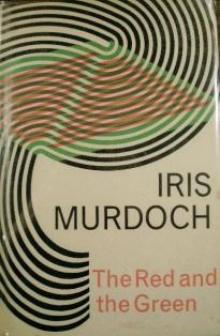 The Red and The Green
The Red and The Green